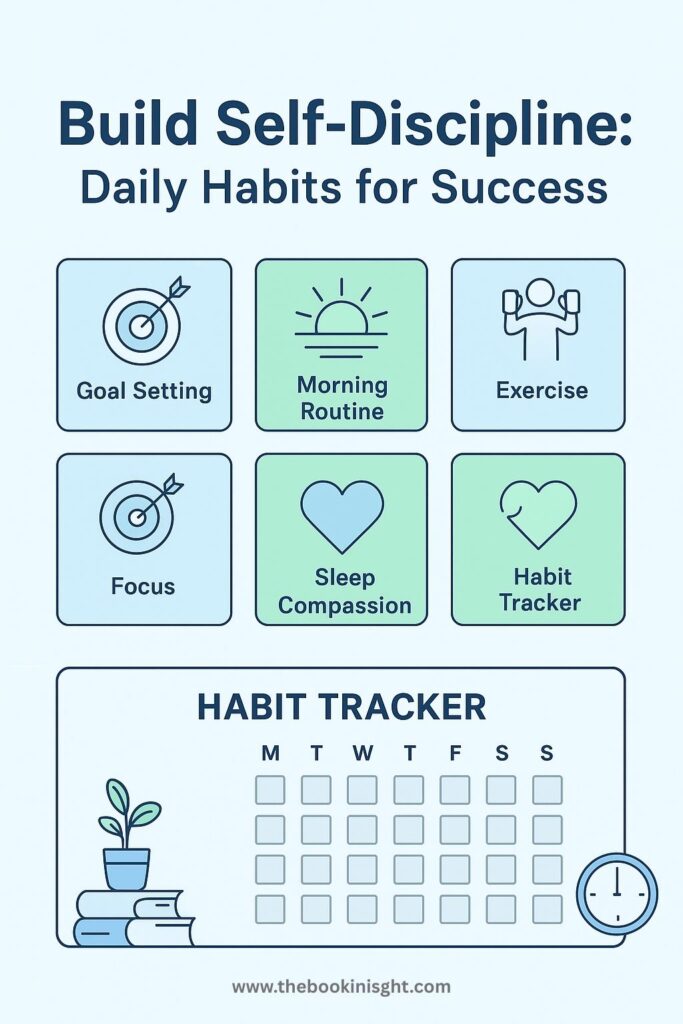Table of Contents
ToggleWhy Self-Discipline is a “Superpower” in life and success?
Success is not built overnight—there’s no magic shortcut to achieving greatness. The hard truth is that motivation fades, but self-discipline stays. While motivation might inspire action for a few days or weeks, self-discipline ensures progress even when life gets tough. Once you build this skill, it becomes your superpower—a steady flame that never burns out.
Discipline is Built, Not Born
Contrary to popular belief, highly disciplined people aren’t born that way. They’ve developed their focus and consistency through habits. Discipline is a skill you can train, just like a muscle. The more you practice, the stronger it becomes.
Habits: The Foundation of Success
Habits are the building blocks of a disciplined life. As James Clear explains in Atomic Habits, success comes from small, consistent actions that compound over time. The habits of highly disciplined people aren’t complicated; they’re simple, repeatable routines that create long-term success.
What You’ll Get from This Article
This isn’t just another motivational piece—it’s a step-by-step guide to:
- Build self-discipline through realistic, daily actions
- Create morning routines for success
- Learn how to stay consistent and crush procrastination
- Adopt productivity habits that help you achieve your goals faster
By the end, you’ll have actionable strategies to start small, stay consistent, and take control of your time, energy, and life.
What is Self-Discipline? and Why It Matters?
Self-discipline is the power to manage your thoughts, emotions, and actions even when distractions or temptations are strong. In simpler words, it’s the ability to control yourself and push forward without needing external reminders or pressure. It’s the inner strength that keeps you moving toward your goals—whether it’s waking up early, hitting the gym, or saving money for the future.
How Self-Discipline Shapes Your Life?
1. Builds Focus on Long-Term Goals
Without discipline, most people chase instant gratification. Self-discipline allows you to delay short-term pleasure for long-term success. This mindset is what separates top performers from the average.
Example: A student preparing for competitive exams sacrifices weekend parties for months or even years, but that discipline often pays off with a successful career.
2. Encourages Consistency in Actions and Efforts
Consistency is the secret sauce of mastery. When you practice something every day, your skills compound.
Think about Tom Cruise—a global icon in action films. His mastery didn’t come overnight; it came from 30+ years of consistent hard work in the same craft, improving with each movie.
3. Fosters Self-Control and Resilience
When you build self-discipline, you become mentally tougher. You stop being easily swayed by distractions or failures. Over time, resilience becomes a natural part of your personality.
4. Leads to Better Decisions and Time Management
Disciplined individuals tend to plan their day, prioritize tasks, and avoid impulsive decisions. This habit improves productivity and reduces stress, making life more balanced and fulfilling.
Motivational Stat to Inspire You
A study from the Journal of Personality and Social Psychology found that self-control is a stronger predictor of academic success than IQ. Another research from the American Psychological Association shows that disciplined people are happier and more satisfied with life because they make better long-term choices.
Habit #1: Start Your Day with a Morning Routine
Why Mornings Are the Key to Discipline?
Our ancestors and great scholars often said, “Own your morning, own your day.” Early mornings are naturally quiet, with fewer distractions, making them perfect for building focus and clarity. The fresh air and peaceful environment help us connect with nature and set a positive tone for the rest of the day.
Practices like meditation and exercise first thing in the morning help train your mind and body to stay centered, productive, and calm. As Robin Sharma emphasized in The 5 AM Club, rising early and following a structured morning routine gives you an edge over 95% of the world.
How a Morning Ritual Shapes Your Day?
When you start your day intentionally, you take control of your time rather than letting chaos dictate it. A fixed morning routine creates structure, reduces decision fatigue, and boosts your energy. You feel more productive, confident, and in charge.
Example: If you snooze your alarm, skip breakfast, and rush through the morning, your stress levels spike, leading to mistakes and poor mood throughout the day. In contrast, waking up early with a plan—hydration, a quick workout, meditation, and reading—sets you up for focus and positivity.
Morning Routines of Successful CEOs
Highly disciplined and successful leaders follow strict morning rituals:
- Tim Cook (CEO of Apple): Wakes up at 3:45 AM to read customer emails and exercise.
- Jeff Bezos (Amazon Founder): Prioritizes slow mornings, starting with meditation, healthy breakfast, and family time.
- Jack Dorsey (Twitter Co-Founder): Begins his day at 5 AM with meditation and a 6-mile run.
- Robin Sharma: Recommends the 20/20/20 formula—20 minutes of exercise, 20 minutes of reflection, 20 minutes of learning.
Motivation Backed by Science
Studies show that early risers are 43% more likely to be productive and achieve goals compared to night owls (University of Texas study). Another Harvard research found that people who wake up earlier are more proactive and better problem solvers.
Habit #2: Practice Daily Goal-Setting
One of the most powerful habits of highly disciplined people is setting clear goals every single day. A simple journaling or planner system can completely transform your productivity and mindset. Writing down your goals each morning helps you focus on what truly matters, rather than getting distracted by less important tasks.
Daily planning builds self-discipline because it forces you to prioritize your actions and take responsibility for how you spend your time. Whether you use a physical journal, a bullet journal, or a digital planner, this practice keeps your thoughts organized and ensures you are working toward your long-term vision step by step.
Example: Imagine starting your day by writing five important tasks in your notebook. At the end of the day, even if you’ve completed four, you’ll feel a deep sense of satisfaction and progress. Over time, this feeling fuels motivation and builds consistency.
Daily goal-setting also ties directly to productivity habits because it removes mental clutter. By planning ahead, you spend less time deciding “what to do next” and more time taking action. This habit reduces stress, improves mental clarity, and gives you a clear roadmap for your day.
Why It Works (Backed by Science):
- According to a study from Dominican University of California, people who write down their goals are 42% more likely to achieve them than those who don’t.
- Journaling has been proven to lower stress levels, boost mental health, and enhance focus, according to research published in the journal Advances in Psychiatric Treatment.
Habit #3: Embrace the Power of Micro-Commitments
One of the smartest ways to build self-discipline is by committing to tiny, manageable actions every day—what James Clear calls “Atomic Habits.” Instead of waiting for motivation to strike or trying to make big changes overnight, start small and let those tiny actions compound over time.
Humans naturally feel driven to fulfill commitments they’ve made, so why not start by making small commitments to yourself? By setting micro-commitments, you trick your brain into building momentum. Over time, these small steps create life-changing habits.
Example:
- Read just one page of a book per day. Once that becomes effortless, increase it to two, then five, and so on.
- Write just 50 words daily. After a week, you’ll have 350 words. In a month, that’s a short article or chapter drafted!
What feels small today becomes unstoppable progress tomorrow. This is the core of productivity habits—breaking down overwhelming goals into micro-actions that you can’t fail at.
Why It Works (Backed by Research):
- A study published in European Journal of Social Psychology found that it takes an average of 66 days to form a new habit, and starting small makes it easier to stick with them.
- James Clear’s Atomic Habits emphasizes the 1% rule: improving just 1% every day compounds to massive growth over time.
Habit #4: Prioritize Physical Fitness
Many people think “exercise” is all about building a muscular body, but that’s a myth. The real goal of exercise is lifelong fitness—to stay strong, energetic, and healthy until your last breath. Regular movement is not about aesthetics; it’s about mental clarity, emotional stability, and physical resilience.
Daily exercise—even a 20-minute walk or light stretching—helps your body and mind work at their best. It’s a cornerstone of self-discipline, as showing up for your body daily reinforces your ability to show up for other areas of life.
Example:
- Start with a 10-minute walk every morning to wake up your body and sharpen your focus.
- Practice desk stretches during work breaks to stay energized and avoid fatigue.
- Gradually include light workouts, yoga, or cycling to strengthen your stamina.
Why It Works (Science-Backed):
- Studies show just 30 minutes of exercise a day reduces stress by up to 40% and lowers the risk of depression.
- According to the CDC, physical activity improves brain health, memory, and productivity, while reducing chronic disease risks.
- A Harvard Medical School study reveals that exercise stimulates endorphins (feel-good hormones) that boost mood and energy levels, helping you stay consistent with other daily habits for self-discipline.
Habit #5: Build a Distraction-Free Environment
In today’s hyper-connected world, digital distractions are the biggest barrier to productivity. From constant notifications to endless scrolling, your brain is bombarded with dopamine hits every few seconds, making it harder to focus deeply on important work.
To build self-discipline, you must first design your environment for success. This is where digital minimalism comes in—deliberately reducing unnecessary digital noise and curating a space that allows you to thrive.
Example:
- Start your day with a dopamine detox: Keep your phone out of reach for the first hour after waking.
- Create a work-only zone with no TV, gaming consoles, or distracting gadgets.
- Turn off unnecessary notifications and uninstall apps that don’t serve your goals.
Why It Works (Science-Backed):
- According to a University of California study, it takes 23 minutes to regain focus after a single interruption.
- Research from Harvard Business Review shows that digital distractions can reduce productivity by up to 40%, impacting mental clarity and decision-making.
- Practicing digital minimalism improves your ability to focus, prioritize, and stay consistent with daily habits for self-discipline.
Habit #6: Develop a Strong Sleep Routine
Many people underestimate how much self-discipline and productivity rely on proper rest. Sleep isn’t just “downtime” for your body—it’s when your brain and muscles recover, recharge, and process information. A well-structured sleep schedule is the foundation for building sustainable discipline and achieving peak performance.
The 8-8-8 Rule for Balance:
A healthy lifestyle follows the 8-8-8 principle—8 hours of sleep, 8 hours of work, and 8 hours for leisure and growth. Prioritizing these eight hours of quality rest is crucial to staying focused, making better decisions, and building self-discipline in all areas of life.
Example:
- Go to bed at the same time every night, even on weekends.
- Create a “wind-down” routine—dim lights, avoid screens, and do light stretches or read before bed.
- Keep your bedroom cool, dark, and tech-free to signal your body it’s time to sleep.
Why It Works (Science-Backed):
- According to the National Sleep Foundation, adults who get 7–9 hours of quality sleep are 33% more productive and experience improved emotional regulation.
- Harvard Medical School research shows that sleep deprivation impairs focus, memory, and decision-making, directly affecting self-discipline.
- Consistent sleep boosts willpower—the mental energy required to build new habits and eliminate bad ones.
Habit #7: Practice Self-Compassion
Many people see discipline as punishment, but in reality, true discipline is an act of self-care and self-respect. Building lasting habits isn’t about being harsh on yourself; it’s about being kind yet consistent.
Why Self-Compassion Builds Discipline:
- Research by Dr. Kristin Neff shows that people who practice self-compassion are more resilient and motivated, even after failure.
- Studies reveal that self-compassionate individuals are 25% more likely to stick to their long-term goals because they recover faster from setbacks.
- Harsh self-criticism, on the other hand, increases stress and burnout, making it harder to sustain habits.
Example:
If you’re trying to wake up early but oversleep one day, instead of beating yourself up, reflect on why it happened—maybe you slept late or felt drained. Use it as feedback to adjust your bedtime routine, not as a reason to quit.
Key Principle:
Discipline is a lifelong journey, not a sprint. Mistakes are part of growth. The key is consistency—showing up again, even when you slip. As James Clear explains in Atomic Habits, missing a habit once has no long-term impact, but letting shame make you quit will.
How to Stick to These Habits (Mini-Guide)
Building self-discipline is easier when you track your progress and create a simple system to stay accountable. Here’s a step-by-step habit tracker guide to make these habits part of your daily life:
Step 1: Start Small – One Habit at a Time
- Begin with just one habit for the first 2–3 weeks (e.g., wake up early, meditate, or write your goals).
- Starting small prevents burnout and builds momentum.
🔑 Research shows that focusing on one change at a time increases success rates by 80%.
Step 2: Use a Simple Tracker
- Create a habit tracker in a notebook, spreadsheet, or an app like Habitica or Notion.
- Make a weekly habit chart with checkboxes for each day of the week.
- Example:
Habit | Mon | Tue | Wed | Thu | Fri | Sat | Sun |
Wake up at 6 AM | ✅ | ✅ | ❌ | ✅ | ✅ | ✅ | ✅ |
Step 3: Stack Habits (Habit Stacking)
- Attach new habits to existing ones.
- Example: After brushing your teeth, meditate for 2 minutes.
- This leverages your brain’s existing routines to build new ones naturally.
Step 4: Set Clear Triggers & Rewards
- Triggers: A specific time or place that cues your habit.
- “I’ll read 10 pages after breakfast.”
- Rewards: A small reward that keeps you motivated.
- “I’ll enjoy my favorite tea after journaling.”
Step 5: Review Weekly
- At the end of the week, review your progress.
- Identify patterns: Are weekends harder? Do mornings work better? Adjust accordingly.
Quick Tips for Success:
- Track visibly: Keep your habit chart somewhere you see daily.
- Celebrate wins: Reward yourself for consistency, even small progress.
- Be flexible: If you miss a day, don’t quit—just restart the next day.
- Pair habits with identity: Say “I am someone who meditates” instead of “I want to meditate.”
Conclusion
Discipline is built daily, not overnight. It’s not about perfection—it’s about showing up every single day, even when it’s hard. Start small, stay consistent, and over time these daily habits for self-discipline will transform your mindset, boost your productivity, and help you reach your goals.
Instead of trying to change everything at once, pick one habit today—just one—and commit to practicing it for the next week. This is how real growth begins: step by step, day by day.
Your Next Steps:
- Choose one habit to start today and track your progress with a habit tracker.
- Share your journey in the comments or with a friend for accountability.
✨ Remember: Productivity habits aren’t a quick fix; they’re a lifelong investment in becoming your best self.



